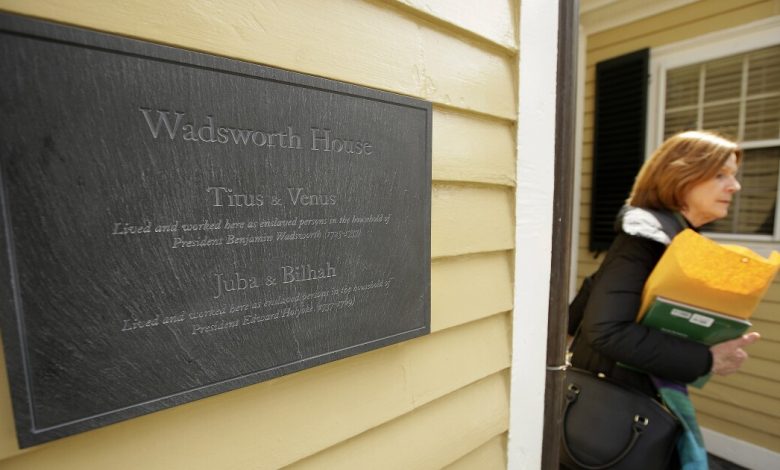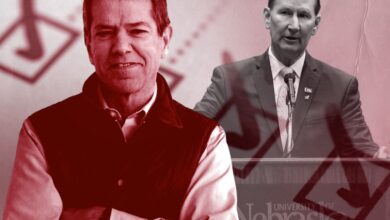Harvard to Spend $100 Million to Atone for ‘Immoral’ Ties to Slavery

[ad_1]
Through its “extensive entanglements” with slavery, Harvard University benefited from and in some ways perpetuated “profoundly immoral” practices that it will spend $100 million helping atone for, the university’s president, Lawrence S. Bacow, wrote in an email on Tuesday to students, faculty, and staff members.
The message was accompanied by a 134-page report that offers painstaking details about Harvard’s direct, financial, and intellectual ties to slavery over several centuries. Harvard is the latest higher-education institution to commit substantial resources to delving into, and helping make amends for, its institutional ties to slavery.
Continuing the work of his predecessors, Bacow in 2019 established the Presidential Committee on Harvard and the Legacy of Slavery to study the issue and report on its findings. Drawing from all of the university’s schools and based primarily at Harvard Radcliffe University, the study involved combing through libraries and other archives at Harvard and around the country.
“As the committee’s report powerfully documents, Harvard’s history includes extensive entanglements with slavery,” Bacow wrote. “The report makes plain that slavery in America was by no means confined to the South. It was embedded in the fabric and the institutions of the North, and it remained legal in Massachusetts until the Supreme Judicial Court ruled it unconstitutional, in 1783.”
Harvard was 147 years old by then, and slavery was firmly entrenched in its institutional history. “Enslaved people worked on our campus, supporting our students, faculty, and staff, including several Harvard presidents,” Bacow went on. “The labor of enslaved people both far and near enriched numerous donors and, ultimately, the institution. Some members of our faculty promoted ideas that gave scholarly legitimacy to concepts of racial superiority. And long after the 13th Amendment abolished slavery in the United States, in 1865, Harvard continued discriminatory practices that sharply limited the presence of African Americans on our campus.”
Over the years, Harvard has become a better, much more diverse institution, but that doesn’t absolve it of its responsibility to make up for past wrongs, Bacow wrote. The legacy of slavery lives on in both overt and subtle discrimination against people of color, he said. It shows up in persistent disparities in education, health, income, social-mobility, and other metrics used to measure equality.
For that reason, Bacow wrote, “I believe we bear a moral responsibility to do what we can to address the persistent, corrosive effects of those historical practices on individuals, on Harvard, and on our society.”
The Harvard Corporation, the university’s chief governing board, authorized spending $100 million to carry out a series of recommendations in the report. The commitment, while a staggering amount for most universities, comes just a few months after Harvard’s endowment was valued at $53.2 billion. Some of the money will be used right away, while the rest will be held in an endowment to support future work. A committee to supervise that work will be led by Martha Minow, a law professor and former dean of Harvard Law School who served on the committee that produced the report.
The report concludes by pointing out that the university isn’t legally required to adopt the recommendations, but has a moral obligation to see them through. Among them, Harvard should:
- Support descendants of enslaved people through research, teaching innovations, and teacher training. Harvard should work with community colleges, tribal colleges, and others already pursuing this work.
- Develop lasting partnerships with historically Black colleges and universities, including by expanding existing ties with research-focused HBCUs and funding yearlong visits to Harvard by HBCU faculty members and students in their junior year.
- Honor and support Native communities to recognize that Harvard leaders and staff members enslaved and sold Indigenous people as well as those of African descent.
- Establish an “endowed legacy of slavery fund” to support Harvard’s reparative efforts.
- Ensure, through annual evaluation and reports, that the university is held accountable for these steps.
The report offers a sweeping history of Harvard’s ties to slavery, including how Harvard presidents and other leaders enslaved more than 70 people, some of whom fed and cared for Harvard students. It describes how the university’s medical researchers, by 1850, had lent scholarly heft to views that promoted white supremacy. Among those researchers were those engaged in so-called race science, which examined racial differences in ways that emphasized the superiority of white and inferiority of African people.
The report also describes how Black students confronted and resisted unequal treatment, the steps Harvard has taken to increase racial diversity, and the vestiges of slavery that remain today.
Bacow encouraged everyone at Harvard to read the report, which he said many would find “disturbing and even shocking,” to learn from it, and to work together “to recognize and redress the injustices that it so carefully documents.”
[ad_2]
Source link






